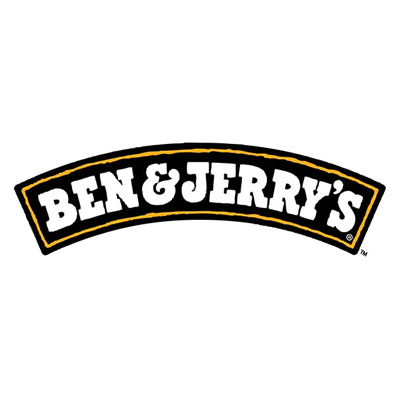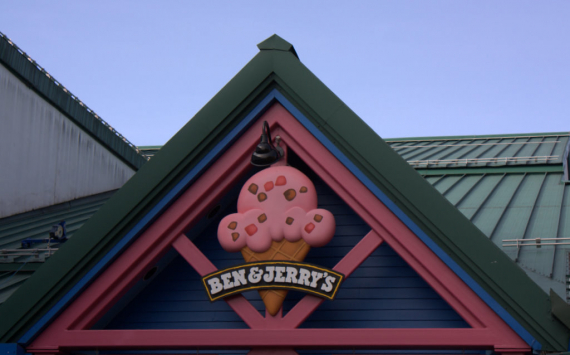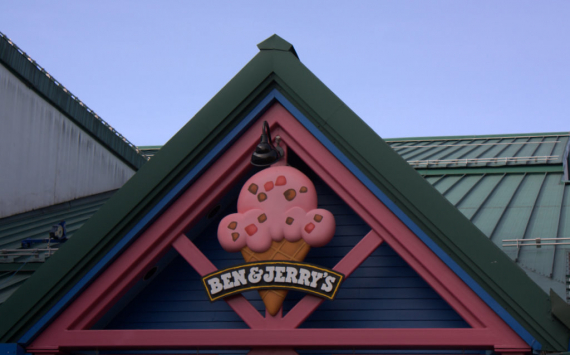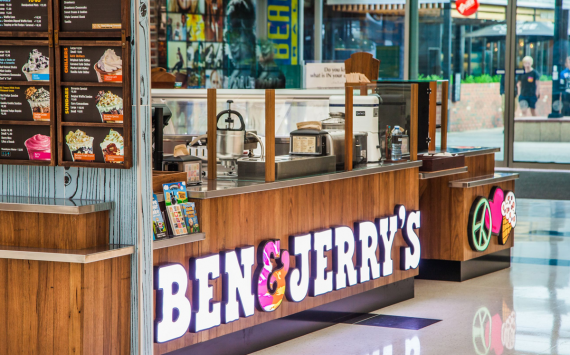Description
Ben & Jerry's Homemade Holdings Inc., trading and commonly known as Ben & Jerry's, is a US-based company that manufactures ice cream, frozen yogurt, and sorbet. Founded in 1978 in Burlington, Vermont, it was sold in 2000 to British conglomerate Unilever. Today, it operates globally as a fully owned subsidiary of Unilever. Its present-day headquarters is in South Burlington, Vermont, with its main factory in Waterbury, Vermont.
History
Founding
The company was founded by Ben Cohen and Jerry Greenfield, two Jewish men who had been friends since their childhood in Merrick, New York. Although Greenfield finished college, he found himself unable to make his way into medical school. Cohen dropped out of school. In 1977, Cohen and Greenfield completed a correspondence course on ice cream making from Pennsylvania State University's creamery. Cohen has severe anosmia, a lack of a sense of smell, and so relies on mouthfeel and texture to provide variety in his diet. This led to the company's trademark chunks being mixed in with their ice cream. On May 5, 1978, with a $12,000 investment (equivalent to $48,000 in 2020), Cohen and Greenfield opened an ice cream parlor in a renovated gas station in downtown Burlington, Vermont. In 1979, they marked their anniversary by holding the first "free cone day", now an annual event at every Ben & Jerry's store.
In 1980, Cohen and Greenfield rented space in an old spool and bobbin mill on South Champlain Street in Burlington and started packing their ice cream in pints. The first Ben & Jerry's franchise opened in 1981, on Route 7 in Shelburne, Vermont. In 1983, Ben & Jerry's ice cream was used to build "the world's largest ice cream sundae" in St. Albans, Vermont; the sundae weighed 27,102 pounds (12,293 kg). That same year, the cows on their cartons were redesigned by local artist Woody Jackson.
In 1984, Häagen-Dazs wanted to limit distribution of Ben & Jerry's in Boston, prompting Ben & Jerry's to file suit against the parent company, Pillsbury, in its "What's the Doughboy Afraid Of?" campaign. In 1987, Häagen-Dazs again tried to enforce exclusive distribution, and Ben & Jerry's filed its second lawsuit against the Pillsbury Company.
In 1985, the Ben & Jerry's Foundation was established at the end of the year with a gift from Ben & Jerry's to fund community-oriented projects; it was then provided with 7.5% of the company's annual pre-tax profits. In 1986, Ben & Jerry's launched its "Cowmobile", a modified mobile home used to distribute free scoops of Ben & Jerry's ice cream in a unique, cross-country "marketing drive"—driven and served by Ben and Jerry themselves. The "Cowmobile" burned to the ground outside of Cleveland four months later, but there were no injuries. Ben said it looked like "the world's largest baked Alaska". In 1987, as a tribute to guitarist Jerry Garcia & Grateful Dead fans everywhere, Ben & Jerry's presented its first ice cream named for a rock legend and the most famous of fan-suggested flavors, "Cherry Garcia". In 1988, the two men won the title of U.S. Small Business Persons of the Year, awarded by U.S. President Ronald Reagan. Also that year, the first brownies were ordered from Greyston Bakery, which led to the development of the popular Chocolate Fudge Brownie flavor. In 1992, Ben & Jerry's joined in a co-operative campaign with the national non-profit Children's Defense Fund; the campaign goal was to bring children's basic needs to the top of the national agenda. Over 70,000 postcards were sent to Congress concerning kids and other national issues. In 1995, they hired Robert Holland, Jr. as CEO after holding a "Yo! I'm your C.E.O." essay contest as part of the search. Holland left after 20 months following philosophical differences and was replaced by Perry Odak in 1997.
In 1989, Ben & Jerry's revealed their opposition to the use of rBGH (recombinant bovine growth hormone) in all their products. This genetically engineered hormone is sometimes given to cows to boost milk production, but Ben & Jerry's does not support this practice and is in favor of using less chemically intensive ingredients for the safety of consumers and the environment.
In 1994, Ben & Jerry's: The Inside Scoop, written by Fred "Chico" Lager, former CEO of Ben & Jerry's Ice Cream, was published. The book tracks the history of how Ben & Jerry's Ice Cream got started. The book focuses on "How Two Real Guys Built a Business with a Social Conscience and a Sense of Humor."
Unilever era
In April 2000, Ben & Jerry's sold the company to British multinational food giant Unilever. In the acquisition agreement, Unilever agreed to carry on the company’s tradition of engaging "in these critical, global economic and social missions". Although the founders' names are still attached to the product, they do not hold any board or management position and are not involved in day-to-day management of the company.
In 2001, Ben & Jerry's U.S. completed the transition to "Eco-Pint" packaging, which packaged all pint flavors in environmentally friendly unbleached paperboard Eco-Pint containers, a decision it later reversed. The use of brown-kraft unbleached paperboard had been a critical first step toward a totally biodegradable pint made without added chlorine. Due to what they described as increasing supply, quality, and cost challenges, Ben & Jerry's discontinued the use of the Eco-Pint in 2006, transitioning to a pint container made out of a bleached paperboard that it said was more readily available.
On Earth Day in 2005, when a vote in the U.S. Senate proposed the opening of the Arctic National Wildlife Refuge to oil drilling, Ben & Jerry's launched a protest by creating the largest ever Baked Alaska, which weighed 900 pounds (410 kg), and placed it in front of the U.S. Capitol Building.
In March 2009, "CyClone Dairy" launched an advertising campaign and a website to promote its milk products, which purportedly came exclusively from cloned cows. On April 1, 2009 (April Fool's Day), Ben & Jerry's announced that it was behind this fake company. Ben & Jerry's had created the tongue-in-cheek hoax to raise awareness of the increasing presence of products from cloned animals within American food and to campaign for a tracking system of cloned-animal products. The hoax was revealed on April Fool's Day with the message: "We believe you should have the right to choose which foods you eat – and not to eat cloned foods if you don't want to. And that's why Ben & Jerry's believes we need a national clone tracking system, so people and companies can know where their food is coming from."
In 2010, Jostein Solheim, a Unilever executive from Norway, was appointed CEO and had this to say about the transition: "My mantra that I've repeated a hundred times since starting at Ben & Jerry's is: 'Change is a wonderful thing,'" he said. "The world needs dramatic change to address the social and environmental challenges we are facing. Values-led businesses can play a critical role in driving that positive change. We need to lead by example, and prove to the world that this is the best way to run a business. Historically, this company has been and must continue to be a pioneer to continually challenge how business can be a force for good and address inequities inherent in global business."
In 2013, Ben & Jerry's committed to making their products GMO-free in support of mandatory GMO labeling legislation.
In 2018, Matthew McCarthy, previously a Unilever executive, was appointed CEO, replacing Solheim.
On July 19, 2021, it was announced that Ben & Jerry's plans to end sales in "Occupied Palestinian Territory", within which Israeli settlements are considered illegal under international law. Due to the refusal of Ben & Jerry's Israel, the local franchisee since 1987, to comply with this policy, the company statement said it did not plan to renew the franchise in 2022. It has been suggested that the decision, while not technically a boycott given the lack of legal recognition of the Palestinian territories as a formal part of Israel under Israeli law, may run foul of anti-boycott laws in a number of US states. The statement, issued by Unilever, was criticized by Ben & Jerry's Independent Board of Directors, which had not wanted to comment on the continuation of sales in other parts of Israel, as this required board approval.




























